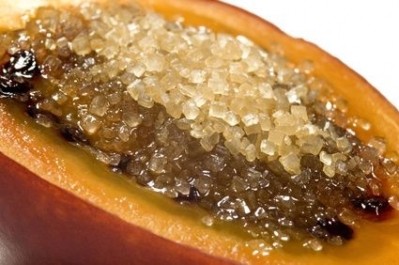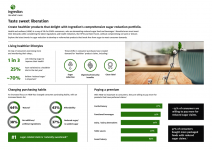Fructose sweeteners may promote Syndrome X
Researchers from the University of Washington report that while no changes were observed in the body weight of their test animals after 10 weeks, the changes in liver and lipid metabolism may lead to the onset of metabolic syndrome, or syndrome X.
Writing in Physiology & Behavior, the researchers compared the effects of agave syrup (90 per cent fructose), fructose, high fructose corn syrup (HFCS), HFCS plus the appetite suppressor Hoodia, or the non-caloric sweetener Stevia.
Animals were given water or one of the sweetened beverages as their only source of liquid at night for three nights per week for 10 weeks. All of the sweeteners were added to drinking water at a level of 12.5 per cent.
At the end of the study, Dianne Figlewicz and her co-workers report that, despite still falling in the normal range, cholesterol levels were higher in the rats fed fructose and HFCS, and triglyceride levels had increases significantly in rats feeding on agave, HFCS, and HFCS plus Hoodia, compared to animals drinking water.
“We demonstrated that moderate consumption of sweeteners in drinking water leads to marked changes of drinking behaviour and that fructose consumption leads to modest but significant changes in markers of liver and lipid metabolism,” wrote Figlewicz and her co-workers.
Liver health
No changes in markers of inflammation were recorded between the groups, and normal liver histology was recorded in all the groups. Significant increases in levels of the liver enzyme alanine aminotransferase were observed in serum from animals fed fructose and HFCS, however. Increased levels of this enzyme are indicative of liver damage or disease.
“Although we did not observe excessive weight gain in all tested sweetener groups, the lipid and liver metabolism changes indicate that even moderate fructose consumption might contribute to the onset or development of the Metabolic Syndrome, which might be exacerbated by consumption of a Westernized high-fat diet, and needs to be investigated in future studies,” they added.
Metabolic syndrome (MetS) is a condition characterised by central obesity, hypertension, and disturbed glucose and insulin metabolism. The syndrome has been linked to increased risks of both type 2 diabetes and CVD.
Fifteen per cent of adult Europeans are estimated to be affected by MetS, while the US statistic is estimated to be a whopping 32 per cent. Obesity is established to be the main risk factor for MetS.
Caveats
Commenting on the limitations of their study, the researchers notes that they used only one concentration of the sweeteners. “This design was chosen because the final concentrations were both isocaloric and preferred by the rats,” they explained. Furthermore, they also said that the limiting of access to the sweetened beverages to only three nights per week was because they “aimed to mimic a more realistic scenario of moderate sweetened beverage intake than providing the rats with more than 50 per cent sugar as total calorie intake”.
They also recognize the omission of a glucose or sucrose group, which was intentional since they “felt that the effects of fructose vs. glucose and sucrose have already been studied extensively”.
Source: Physiology & Behavior
Published online ahead of print, doi: 10.1016/j.physbeh.2009.09.016
“Effect of moderate intake of sweeteners on metabolic health in the rat”
Authors: D.P. Figlewicz, G. Ioannou, J. Bennett Jay, S. Kittleson, C. Savard, C.L. Roth























